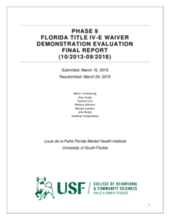This report presents findings from an implementation analysis aimed at describing implementation of the U.S. state of Florida Title IV-E Demonstration Project, which allowed the state to use certain federal funds more flexibly, for services other than room and board expenses for children served in out-of-home care. The goal of the implementation analysis was to track changes and to identify lessons learned.
The implementation analysis findings from stakeholder interviews showed that the goals of the Demonstration have been supported throughout the child welfare system in Florida. Each stakeholder described an increase in the types of services available for families. Stakeholders also described the increased focus on keeping children safely in the home. Although there were still challenges reported that affected child welfare work. Common challenges described were turnover among case managers and CPIs, increases in out-of-home care, lack of housing resources, and a lack of substance abuse and mental health services. Participants reported that the need for mental health and substance abuse services was increasing. Participants perceived the increases were due to increases in opioid use and increased recognition of mental health concerns through the assessment process implemented by the child welfare practice model. Poverty, lack of housing, generational DCF involvement, and a negative perception of DCF were reported barriers for child welfare involved families across stakeholder groups.

